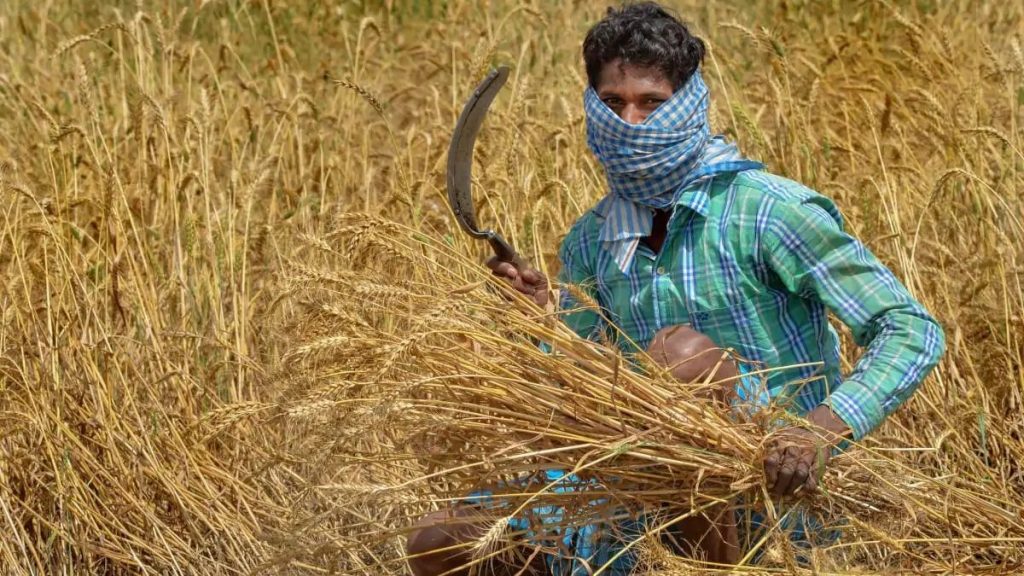Dhurjati Mukherjee
Agricultural reforms are imperative in our country as these have a high potential to look after a major segment of the population. There is need not just to increase productivity, but also to ensure that farmers get a better deal and are assured of higher returns. However, there is a lacuna for various reasons and the government too is not forthcoming.
The system is such that not just farmers but middlemen and traders have been the intended beneficiaries. Even the MS Swaminathan Commission Report suggested implementing the C2 (complete costs) +50 per cent formulation. At the same time, there has been talk, over the years, of diversification of crops for better returns but such change has only been resorted to by the big and medium farmers.
The whole picture in the agricultural sector needs to focus on small farmers, who have to struggle hard for a livelihood. Every year there are various problems such as floods or drought as also soil salinisation, pest infections. This is reflected from the National Sample Survey Office (NSSO) estimates, which showed that rural indebtedness had risen by 12 per cent between 1993 and 2013 which may have gone up to around 18 per cent presently.
Successive governments have done precious little for small farmers and sharecroppers over the years as a result of which this section of the farm community has suffered greatly. There were no efforts to form cooperatives by mobilising 10 to 15 farmers so that the integrated landholding becomes lucrative. Also, the Indian Council for Agricultural Research (ICAR) has done little to transfer technology to poor farmers.
Undoubtedly, big farmers have been largely helped by government policies which seem to favour them. The technocrats at the higher echelons of power have failed to understand the sheer problems faced by small farmers and how these should be addressed and redressed. All reforms are formulated, keeping in view the benefits that can be extended to big farmers and traders of agricultural produce. The latter have over the years exploited the farmers in various ways.
Apparently, this move towards corporatisation of agriculture started a few years back. A committee headed by BJP veteran, Shanta Kumar, recommended as early as 2015 the encouragement of private players in agriculture trade, including procurement and storage, deregulation of the fertilizer sector and reduction in the number of beneficiaries under the Food Security Act. At the same time it is certain that for the survival of small farmers there has to be a bare minimum support price (MSP), for those having intimate knowledge of the backward villages in the country, would tend to agree that this class of farmers cannot afford to go far to sell their produce.
The new farm Acts may help medium and big farmers who have the resources to go for higher prices, ignoring the MSP. The Vajpayee government had initiated marketing and contract farming reforms in 2003 through a model Act to be adopted by States but the latter implemented it only half-heartedly. However, what has not been given due consideration is the fact that without clear cut guidelines regarding MSP, there could arise a situation where food security itself may be jeopardised.
Recently, Prime Minister Modi said that procurement of food crop at MSP was a key element of the country’s food security system and that his government was committed to it, while speaking at the 75th session of the FAL. But surprisingly there was no mention of this in the recent legislations. Farm producers’ organisations, which Modi said are in the process of being established, should have been set up before the legislations were formulated.
Meanwhile, in a recent development, the Punjab Assembly passed three bills which create a safety net for famers by making trading below the MSP punishable by law. These bills clearly stated that any corporate house or trader who violates the MSP will have to pay a fine and face imprisonment up to three years. Traders are barred from operating in Punjab without a license issued by the State government and the power to fix foodgrain stock limits is vested in the State rather than the Centre.
This was followed by Chhattisgarh, which passed a bill to enact its own farm laws to ‘protect’ its farmers from the Centre’s agri-reform laws. One of the key provisions of the amended Chhattisgarh Krishi Upai Mandi Act is to ensure that the farm produce isn’t sold below MSP in mandis or elsewhere. This Act has been passed so that farmers don’t get cheated by traders and businessmen.
One may mention here that advanced countries have for long been pressing India to import foodgrains, of which they have a surplus and export other crops where they are deficient. India had been a foodgrain importer in the late 50s and 60s, buying wheat from the US under PL 480. If the pressure is not thwarted, such imports may have a great impact on the country’s economy.
In this context it needs to be stressed that with the population increasing at a fast pace and food security to be ensured to all people, there is need to ensure that food production is not hampered. Also, small and marginal farmers comprise around 70-75 per cent of the farming community and they do not have the capacity to store their produce and go elsewhere for better prices. Thus, whatever reforms are initiated have to take into consideration these factors.
But it’s indeed tragic that reforms initiated in this country are done without understanding the ground reality i.e. plans that would benefit the maximum number of people. As such, without bringing in the three Acts, an expert committee should have been formed with agricultural scientists and representative of farmers’ organisations to get their views/recommendations on the subject.
The writer is a Kolkata-based journalist and author, who has been writing on socio-economic, developmental and environmental issues. INFA
